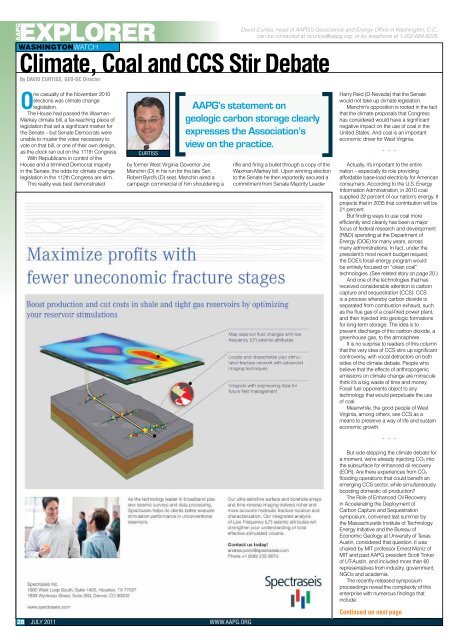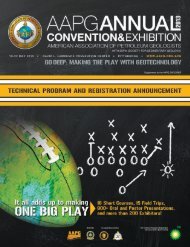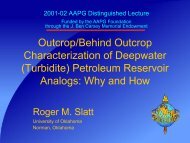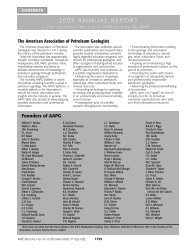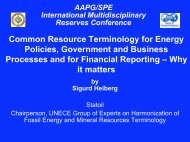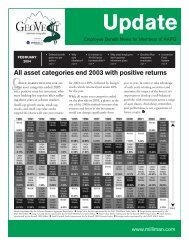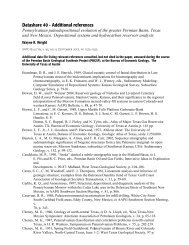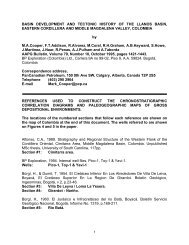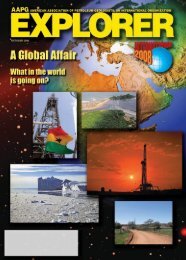AAPG Explorer - American Association of Petroleum Geologists
AAPG Explorer - American Association of Petroleum Geologists
AAPG Explorer - American Association of Petroleum Geologists
Create successful ePaper yourself
Turn your PDF publications into a flip-book with our unique Google optimized e-Paper software.
<strong>AAPG</strong><br />
EXPLORER<br />
WASHINGTONWATCH<br />
Climate, Coal and CCS Stir Debate<br />
By DAVID CURTISS, GEO-DC Director<br />
One casualty <strong>of</strong> the November 2010<br />
elections was climate change<br />
legislation.<br />
The House had passed the Waxman-<br />
Markey climate bill, a far-reaching piece <strong>of</strong><br />
legislation that set a significant marker for<br />
the Senate – but Senate Democrats were<br />
unable to muster the votes necessary to<br />
vote on that bill, or one <strong>of</strong> their own design,<br />
as the clock ran out on the 111th Congress.<br />
With Republicans in control <strong>of</strong> the<br />
House and a trimmed Democrat majority<br />
in the Senate, the odds for climate change<br />
legislation in the 112th Congress are slim.<br />
This reality was best demonstrated<br />
CURTISS<br />
by former West Virginia Governor Joe<br />
Manchin (D) in his run for the late Sen.<br />
Robert Byrd’s (D) seat. Manchin aired a<br />
campaign commercial <strong>of</strong> him shouldering a<br />
28 JULY 2011 WWW.<strong>AAPG</strong>.ORG<br />
David Curtiss, head <strong>of</strong> <strong>AAPG</strong>’s Geoscience and Energy Office in Washington, D.C.,<br />
can be contacted at dcurtiss@aapg.org; or by telephone at 1-202-684-8225.<br />
<strong>AAPG</strong>’s statement on<br />
geologic carbon storage clearly<br />
expresses the <strong>Association</strong>’s<br />
view on the practice.<br />
rifle and firing a bullet through a copy <strong>of</strong> the<br />
Waxman-Markey bill. Upon winning election<br />
to the Senate he then reportedly secured a<br />
commitment from Senate Majority Leader<br />
Harry Reid (D-Nevada) that the Senate<br />
would not take up climate legislation.<br />
Manchin’s opposition is rooted in the fact<br />
that the climate proposals that Congress<br />
has considered would have a significant<br />
negative impact on the use <strong>of</strong> coal in the<br />
United States. And coal is an important<br />
economic driver for West Virginia.<br />
* * *<br />
Actually, it’s important to the entire<br />
nation – especially its role providing<br />
affordable base-load electricity for <strong>American</strong><br />
consumers. According to the U.S. Energy<br />
Information Administration, in 2010 coal<br />
supplied 22 percent <strong>of</strong> our nation’s energy. It<br />
projects that in 2035 that contribution will be<br />
21 percent.<br />
But finding ways to use coal more<br />
efficiently and cleanly has been a major<br />
focus <strong>of</strong> federal research and development<br />
(R&D) spending at the Department <strong>of</strong><br />
Energy (DOE) for many years, across<br />
many administrations. In fact, under the<br />
president’s most recent budget request,<br />
the DOE’s fossil energy program would<br />
be entirely focused on “clean coal”<br />
technologies. (See related story on page 20.)<br />
And one <strong>of</strong> the technologies that has<br />
received considerable attention is carbon<br />
capture and sequestration (CCS). CCS<br />
is a process whereby carbon dioxide is<br />
separated from combustion exhaust, such<br />
as the flue gas <strong>of</strong> a coal-fired power plant,<br />
and then injected into geologic formations<br />
for long-term storage. The idea is to<br />
prevent discharge <strong>of</strong> this carbon dioxide, a<br />
greenhouse gas, to the atmosphere.<br />
It is no surprise to readers <strong>of</strong> this column<br />
that the very idea <strong>of</strong> CCS stirs up significant<br />
controversy, with vocal detractors on both<br />
sides <strong>of</strong> the climate debate. People who<br />
believe that the effects <strong>of</strong> anthropogenic<br />
emissions on climate change are miniscule<br />
think it’s a big waste <strong>of</strong> time and money.<br />
Fossil fuel opponents object to any<br />
technology that would perpetuate the use<br />
<strong>of</strong> coal.<br />
Meanwhile, the good people <strong>of</strong> West<br />
Virginia, among others, see CCS as a<br />
means to preserve a way <strong>of</strong> life and sustain<br />
economic growth.<br />
* * *<br />
But side-stepping the climate debate for<br />
a moment, we’re already injecting CO2 into<br />
the subsurface for enhanced oil recovery<br />
(EOR). Are there experiences from CO2<br />
flooding operations that could benefit an<br />
emerging CCS sector, while simultaneously<br />
boosting domestic oil production?<br />
The Role <strong>of</strong> Enhanced Oil Recovery<br />
in Accelerating the Deployment <strong>of</strong><br />
Carbon Capture and Sequestration<br />
symposium, convened last summer by<br />
the Massachusetts Institute <strong>of</strong> Technology<br />
Energy Initiative and the Bureau <strong>of</strong><br />
Economic Geology at University <strong>of</strong> Texas<br />
Austin, considered that question. It was<br />
chaired by MIT pr<strong>of</strong>essor Ernest Moniz <strong>of</strong><br />
MIT and past <strong>AAPG</strong> president Scott Tinker<br />
<strong>of</strong> UT-Austin, and included more than 60<br />
representatives from industry, government,<br />
NGOs and academia.<br />
The recently released symposium<br />
proceedings reveal the complexity <strong>of</strong> this<br />
enterprise with numerous findings that<br />
include:<br />
Continued on next page


